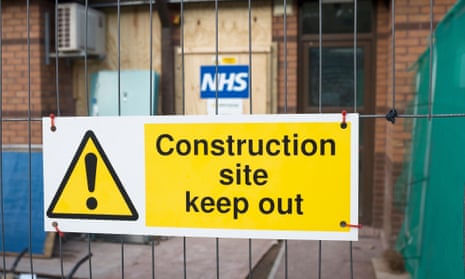Plans by the government to construct and renovate 40 hospitals in England could be delayed because of new analysis suggesting the health and social care department’s capital spending budget faces a real-terms cut of £700m next year, according to the Liberal Democrats.
With some hospitals said to be in dire need of repair, the health secretary twice refused to say on Sunday that the NHS was functioning properly and instead admitted it was under “severe pressure”.
Figures released in the autumn statement show that £12bn has been allocated to the Department of Health and Social Care (DHSC) for its capital budget in 2022-23, which is used for research and development as well as long-term investment in building and maintaining NHS buildings, facilities and equipment. However, £11.7bn has been promised for the following year.
Using the Office for Budget Responsibility’s “GDP deflator”, which measures expected changes to inflation over the next few years, the Lib Dems calculated there may be a real-terms fall in the capital budget of £700m in 2023-24.
Daisy Cooper, the party’s health spokesperson, said it would potentially slow down the speed at which hospitals are built or renovated, compounding fears revealed by NHS bosses over the summer that the programme was “moving at a glacial pace”.
She said the Conservatives “look set to cut the funding needed right now for their key promise of 40 new hospitals by 2030”. She added: “Our nation’s hospitals are in dire need of repair: there are too many horror stories of roofs leaking, crammed corridors and swelteringly hot intensive care wards.”
The government insisted it would stick to its timetable of delivering the hospital construction and renovations by 2030, hailing it as “the biggest hospital building programme” that would ensure “a stronger future for the NHS”.
A spokesperson for DHSC added: “We are taking action to speed up the construction of hospital sites, including spending time developing designs that can be shared across projects, preparing the construction industry for works, and building hospitals simultaneously.”
It came after the health secretary, Steve Barclay, insisted the government had not given up on its promise to “fix social care”, given moves to cap costs had been pushed back to October 2025.
He said it had been a difficult decision to delay by two years plans announced by Boris Johnson to raise the amount of assets a person can have before getting state funding for social care from £23,250 to £100,000, as well as capping lifetime care costs at £86,000.
An estimated 540,000 people in England are awaiting social care, financial assessment or a review.
Barclay stressed there was an “immediate issue” with hospitals, given an operations backlog and rising ambulance wait times.
He blamed the social care reforms delay on the pandemic, saying that the number of people waiting more than a year for an operation had been just 1,300 before Covid and had now risen to 400,000. “Delaying these reforms enables us to fix the real challenges we’re seeing in our A&E departments and in our ambulance services,” he said.
after newsletter promotion
Asked twice if the health service was working properly, Barclay did not say yes. Instead, he said the NHS was “under severe pressure” and that despite “the very real challenges” in drawing up the chancellor Jeremy Hunt’s autumn statement, the NHS would get an extra £3.3bn in each of the next two years while £4.7bn would go into social care.
Explaining why he wanted to scale back the number of NHS targets, Barclay told Sky News there was a place for them, but added: “If everything is a priority, nothing’s a priority.”
He said officials at a local level were “better able to tailor the priorities for their local needs”.
As nurses prepare to strike for the first time, Barclay said his “door is open” and he had met the heads of the Royal College of Nurses and Unison this week.
Gary Smith, the general secretary of the GMB union, said he was “incandescent” at the health secretary’s reassurances. He said Barclay was “deluded and pretty dishonest” about there having been any productive meetings that could curtail strike action.
He called for the government to axe the non-domicile status for about 70,000 super-rich people who live in the UK but pay no tax on their offshore income, and reinstate the cap on bankers’ bonuses to help give more money to the NHS.










